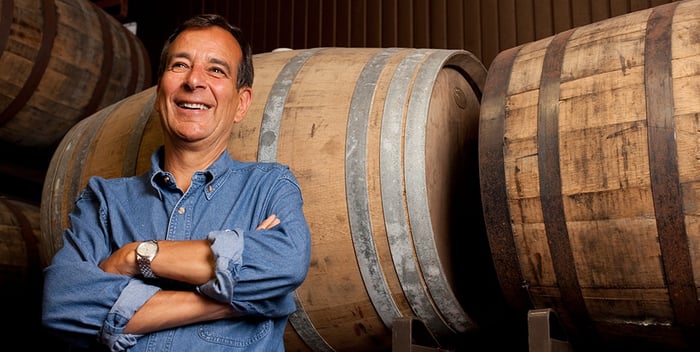Boston Beer (SAM 1.88%) founder and chairman Jim Koch thinks the megabrewers should go back to making funny commercials and leave the craft beer industry alone. He says they're important to the industry, as they draw in beer drinkers, but if they persist in buying up small, independent brewers, then he wants the government to step in and stop them.
Fresh from penning a New York Times op-ed that lamented the buying spree Anheuser-Busch InBev (BUD 0.39%) was on, Koch doubled down on his call for industry regulation to keep the megabrewers at bay. He told industry site Food Dive, "The Department of Justice needs to look very closely at the ability of the big brewers to buy up competition."

Jim Koch. Image source: Boston Beer.
An industry duopoly
Once the Justice Department allowed Anheuser-Busch to acquire SABMiller, it permitted the production of 90% of all beer to be concentrated into the hands of just two brewers, A-B and Molson Coors (TAP 0.44%). And though it purportedly placed restrictions on A-B's ability to buy up craft beer without undergoing intense scrutiny, the megabrewer's acquisition of three more leading regional brewers afterwards suggests it's thumbing its nose at the supposed limits.
Koch sees the loss of these craft beers to the big boys as an assault on the consumer. He told Food Dive the mergers merely give the illusion of choice, but it's a selection that's actually driven by the industry giants. Said Koch, "The beer drinker should have the ability to choose their beers rather than have it controlled by the brewers."
There is some truth to Koch's point. Many beer drinkers don't know (and might not care, either) that their favorite "craft" beer is really owned by a major brewer. Molson Coors owns Blue Moon and Anheuser-Busch developed Shock Top in response to Blue Moon's success, but has bought about a dozen more brands over the past few years. Constellation Brands spent $1 billion to acquire Ballast Point Brewing, and has since turned it into the fastest-growing craft brewer in the country. Craft Brew Alliance (BREW) -- which A-B owns about a third of -- owns Kona Brewing, Redhook, and Widmer Brothers; and Heineken just bought the rest of Lagunitas that it didn't already own.
A focus on size
Regardless of the relative success of their brands, the beer is not being produced by true craft brewers. According to the Brewers Association, which represents the industry, a craft brewer shares these common traits:
- Small: Annual production of 6 million barrels of beer or fewer.
- Independent: Less than 25% of the craft brewery is owned or controlled by mass brewers.
- Traditional: Derives its flavor from the use of traditional or innovative ingredients and their fermentation.
Yet, other than a bunch of beer snobs, many beer drinkers don't much care whether the beer is true craft or mass craft so long as it tastes good.
And there's good reason for the big brewers to buy their way into the business: it's just cheaper. As Molson Coor's vice chairman told Food Dive, there are only so many ways to do craft:
You can do three things -- you can buy, borrow, or you can build. Well, we think it's cheaper to buy than to build or borrow. So we're going to do what is economically most viable for our company.
There's much greater risk involved in starting up your own beer from the ground up. Buying an established brand that has a loyal following helps ensure success, and it also provides the craft brewery owners with a way of cashing out. Regulating away the right of megabrewers to buy their craft brethren, as Koch wants, would unfairly prevent small brewers from being able to profit from their success.

Image source: Getty Images
Sagging sales
Yet the problems Koch's Boston Beer is facing isn't a result of Anheuser-Busch buying up the competition, but rather the changing tastes of drinkers. On the one hand many are turning to regional brewers looking for that local flavor, while on the other their palettes are becoming more refined. Whiskey, for example, is exploding in popularity now, particularly the flavored varieties that are siphoning off some beer drinkers, and there's even some correlation with the legalization of marijuana to the decline of beer.
And the industry's problem isn't the concentration of craft brewers in the hands of the megabrewers, but in the existing archaic distribution regulations. Called the three-tier system, it's a patchwork of state laws erected after the repeal of Prohibition that limits competition by prohibiting brewers from selling directly to a consumer. Instead, the system requires beer go through a middleman -- a distributor or retailer -- who then sells it to the consumer. It needlessly raises the cost of beer, so the problem isn't who's brewing the beer, but how it gets distributed.
Jim Koch's call for more regulation of Anheuser-Busch and other megabrewers would only add another layer of control on craft brewers and won't solve Boston Beer's problems. However, it just might compound them, and that does no good for the craft beer industry.





